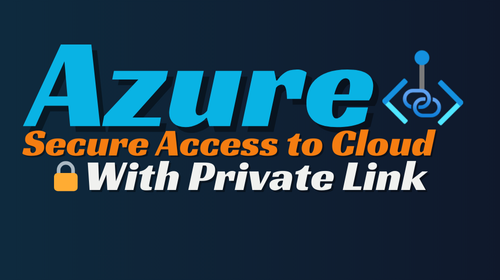- Home
- Security & Compliance
- Secure and Private Connectivity for Your Cloud Services 🔒
Secure and Private Connectivity for Your Cloud Services 🔒
Azure Private Link: Secure and Private Connectivity for Your Cloud Services
What is Azure Private Link?
For years, Microsoft customers have requested better security and usability for their Platform as a Service (PaaS) applications without the hassle of managing numerous Network Security Groups (NSGs), firewalls, or access lists.
So Azure Private Link, This solution includes two main components: Private Endpoint and Private Link Service.
Private Endpoint: This lets you assign a private IP address to your PaaS applications. Your internal resources and customers can then connect securely over your VPN or peered networks, eliminating the need for public access and reducing the administrative burden of managing NSGs, firewalls, and IP lists. Traffic through these private endpoints stays within the Microsoft backbone network, never touching the public Internet.
Private Link Service: This feature extends Private Endpoints to your business partners or customers. It includes an approval process for added security, ensuring that only authorized users can access your internal resources.
With Azure Private Link, you get a secure, simplified way to connect your applications and resources.
Key Benefits of Azure Private Link 🌟
Azure Private Link offers several key advantages:
🔒 Private Access to Azure Services: Use private endpoints to connect your virtual network to various Azure services. Providers can host services in their network, and consumers can access them from their own network. The Private Link platform ensures secure connectivity over the Azure backbone network.
🌐 Easy Access from On-Premises and Peered Networks: Access Azure services from on-premises environments through ExpressRoute private peering, VPN tunnels, and peered virtual networks using private endpoints. No need for ExpressRoute Microsoft peering or internet traversal, making migration to Azure more secure.
🛡️ Data Leakage Protection: Private endpoints map to specific instances of PaaS resources, restricting consumer access to just those resources and preventing access to others in the service. This reduces the risk of data leakage.
🌍 Global Connectivity: Connect privately to services in different regions. Your virtual network in one region can connect to services behind Private Link in another region, providing global reach.
🔗 Extend Private Link to Your Services: Offer your services privately using Azure Private Link. By placing your service behind an Azure Load Balancer, consumers can connect directly to it through private endpoints in their virtual network. Manage connection requests with an approval process, and enjoy compatibility across different Microsoft Entra tenants.

Use Cases for Azure Private Link
Secure Access to Azure Services: Private Link enables secure access to Azure services like Azure SQL Database, Azure Storage, and more, ensuring that data remains within the Azure network.
Hybrid Cloud Architectures: Organizations using a hybrid cloud approach can leverage Private Link to ensure secure and private communication between on-premises environments and Azure.
Partner and Vendor Integrations: Enterprises can use Private Link to securely connect with partners and vendors, enabling private and secure data exchange.
Microservices Architectures: Private Link can be used to secure communication between microservices hosted in different VNets, ensuring that all traffic remains private and secure.
Detailed Architecture: Azure Private Link in a Hub-and-Spoke Network
To illustrate the power and flexibility of Azure Private Link, let’s explore an advanced architecture that leverages Private Link in a hub-and-spoke network. This setup ensures secure, private access to Azure services from both on-premises and within Azure.

Components
On-premises Network: Represents the corporate network located on-premises.
Azure ExpressRoute Gateway: Connects the on-premises network to Azure through a private, high-speed, and low-latency connection called ExpressRoute. This is established via private peering.
Virtual Network (VNet):
- There are two virtual networks depicted:
- Consumer Network (VNet in Region A):
10.0.0.0/16 - Provider Network (VNet in Region B):
192.168.0.0/16
- Consumer Network (VNet in Region A):
- These networks are associated with different Azure AD tenants and subscriptions.
- There are two virtual networks depicted:
Subnets:
- Consumer Network Subnet:
10.0.1.0/24 - Provider Network Subnet:
192.168.0.0/24 - Subnets within the virtual networks where resources like VMs are deployed.
- Consumer Network Subnet:
Network Security Group (NSG):
- Deny Outbound: Applied to the subnet in the consumer network to restrict outbound traffic.
- Deny Inbound: Applied to the subnet in the provider network to restrict inbound traffic.
Private Endpoints:
- Consumer Network: Private endpoints (e.g.,
10.0.0.5,10.0.0.6) enable private connectivity to Azure services. - These endpoints use private IP addresses within the VNet to securely connect to the services over the Microsoft network.
- Consumer Network: Private endpoints (e.g.,
Azure Private Link:
- Provides private connectivity from the consumer network to various Azure services (e.g., Azure SQL Database, Azure Cosmos DB, Azure Storage, etc.) via private endpoints.
- Traffic is carried over the Microsoft network, ensuring it does not traverse the public internet.
Load Balancer:
- A standard load balancer in the provider network that distributes traffic to virtual machines (VMs) in a Virtual Machine Scale Set (VMSS).
- Frontend IP:
192.168.0.10 - Backend Pool: Contains VMs with private IPs (e.g.,
192.168.0.1).
Functionality
Private Link and Endpoints:
- Private Link allows secure and private connectivity to Azure services from the consumer network using private endpoints.
- These endpoints use private IP addresses from the VNet and ensure traffic remains on the Microsoft network.
Network Security Groups (NSGs):
- NSGs provide fine-grained control over the inbound and outbound traffic to and from the subnets.
- The NSG applied to the consumer network subnet denies outbound traffic, ensuring all traffic to Azure services goes through private endpoints.
- The NSG in the provider network denies inbound traffic, enhancing security by restricting access to the VMs behind the load balancer.
ExpressRoute:
- Provides a dedicated, high-throughput, and low-latency connection from the on-premises network to Azure.
- Facilitates secure, private access to Azure services and resources.
Use Case
This architecture is ideal for scenarios where secure, private access to Azure services is required from both on-premises and within Azure. The hub-and-spoke model allows centralized control and management of network traffic, improving security and governance.
This architecture ensures that critical data remains secure by leveraging private connectivity, network security groups, and ExpressRoute.
In summery Azure Private Link is a powerful tool for ensuring secure and private connectivity to Azure services. By keeping traffic within the Microsoft network, Private Link enhances security, performance, and compliance. Whether you are securing access to Azure services, integrating with partners, or building hybrid cloud architectures, Azure Private Link offers the flexibility and security needed to meet your requirements.

